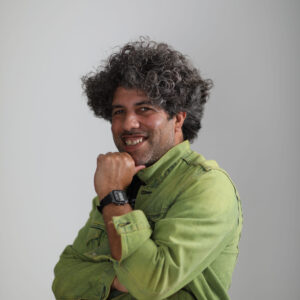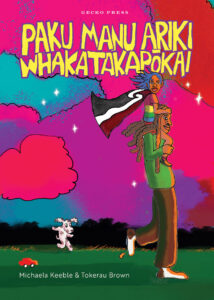 Michaela Keeble is a lover of birds, fish and social justice, who also publishes poetry and short fiction. She grew up on Wurundjeri land in Australia and now lives on the Kāpiti Coast. Paku Manu Ariki Whakatakapōkai is based on conversations with her son Kerehi Grace (Ngāti Toa Rangatira, Ngāti Porou).
Michaela Keeble is a lover of birds, fish and social justice, who also publishes poetry and short fiction. She grew up on Wurundjeri land in Australia and now lives on the Kāpiti Coast. Paku Manu Ariki Whakatakapōkai is based on conversations with her son Kerehi Grace (Ngāti Toa Rangatira, Ngāti Porou).
What is important to you about Paku Manu Ariki Whakatakapōkai?
So much! This book is a true co-creation between my son Kerehi Grace, the illustrator Tokerau Brown, and me. Sometimes, as the book was being invented, Toki (Tokerau) would share a picture, and I’d get a shiver—a feeling that the picture contains life inside it, is itself alive. There are many presences in this story, and I love how unique and unapologetic it is. I hope it inspires kids, parents and other caregivers to stand up for each other, and for others.
What role did your son Kerehi play in the creation of this book?
All the words in this book come from Kerehi. Kerehi is the youngest of our family, and a born questioner. Like many kids, he’s always trying to make connections, between home life, life at kindy or kura, and the life we see and hear on the TV or the radio.
I got into the habit of writing down all his wild and way-out observations and one day felt a story emerge. I pulled together all those bits of paper, and instead of editing out the parts that didn’t seem, appropriate, I let everything stay in.
So, this book is of Kerehi, and from Kerehi, but it’s also filtered through me—a bit of an outsider and a rebel as well.
Can you tell us about the collaborative process of working with Toki?
I have learned so much I could write another book! I’ve learned that stories grow of their own accord, and trying to control or curtail them is futile.
Toki is a rare genius adult who remembers exactly what it is to be a kid. I don’t remember very much from being a kid, or even to be honest from being an adult. Toki opens doors in memories and visions fly out.
He has created a world for Paku Manu Ariki Whakatakapōkai that’s epic, inclusive, funny, kind and real. Toki has also filled this world with the friends, creatures, adults and ancestors that surround this story but aren’t necessarily visible in the words.
What did you love about Toki’s illustrations? What did you see in Toki’s work?
Tokerau is like a hundred different artists shapeshifting inside one body. The first pictures of Toki’s I loved were some of his ink pieces. They reminded me of Ralph Steadman, but also weren’t like anything I’d seen (not that I know very much about art). Wheke and sharks and towers and humans, all in proportions that were more like dream or ancient story than reality. Then I saw his ink and watercolour work “Dinosaur Boy” (a picture of his nephew) and knew he would understand this story and this kid. From those early ideas, Tokerau has developed a whole new visual language, I think. I can’t wait to see where he goes next.
 Tokerau Brown is a Cook Islands Māori illustrator and multimedia artist. Co-director of Māori Pasifika art gallery Wheke Fortress, Brown is also a musician, audio engineer and animator.
Tokerau Brown is a Cook Islands Māori illustrator and multimedia artist. Co-director of Māori Pasifika art gallery Wheke Fortress, Brown is also a musician, audio engineer and animator.
Paku Manu Ariki Whakatakapōkai is in a quest to remake the world, and to make sure he belongs in it, even if it sometimes feels like he doesn’t. What are your thoughts?
Rebuilding the world is a thing I’m really into at the moment. We need to keep children thinking about how they can change the world, heal the world and create the world they want to be in. They are the future! We can empower them to realise their vision. Let them know they can tell their stories and live the lives they want to live. They can show us new hope and new dreams, unshackled from old ways of thinking. They are the characters channelling the stories of their cultures and ancestors.
What about the story resonates with you?
Kerehi’s words just leap off the page. It’s like I’m channelling my own thoughts from my childhood. The sentence “Everything was born at the same time as me” is brilliant. Paku Manu Ariki Whakatakapōkai asks questions and has ideas as deep and thoughtful as anything an adult would come up with. Michaela has carved an intricate, layered tale, weaving Kerehi’s thoughts and dreams into an honest conversation between mother and child. And it is SO funny! There are many subtle jokes that I come back to again and again.
How is creating a picture book different from your previous work in music and art?
I’ve made zines and comics before but usually only a few pages, so this 48-page book was daunting. I loved it though and was excited to challenge myself. I think the main thing I’ve learned is to let the inspiration come, and to work closely with the author to absorb their world as much as possible and let that drive the pen on the paper.
Has anything surprised you along the way?
Some things I randomly came up with have a parallel in the real world. That made me go deeper. I asked for photos and things Michaela or Kerehi wanted in the story, which also informed my creative decisions. For instance, I didn’t know what Kerehi’s dad looked like, but once I’d drawn him, Michaela let me know he looks exactly like that, and sent a photo. I was floored! The work is meant to come out a certain way, and in the process, something instinctive and quiet happens.
Tell us more about your illustration process
It’s been a challenging but really fulfilling process. I love doing unique, original work, and telling stories with pictures. The fun with the digital process is the flexibility of changing anything, trying things out. I started with simple black and white drawings using ink, and scanned the images to work on further. I used some of the ink splotches to create brushes in Procreate, which ended up closely matching the real ink lines. This meant I could change things to look ‘real’ or ‘digital’ depending on what effect was needed. I love mess, lines and movement.
This book circles around identity and growing up, finding one’s place in the scheme of things. How does it apply to you and your experience growing up?
I grew up in Whanganui. There was the Whanganui awa, school and the local swimming pool. I would ride around wherever I wanted on my BMX and just had to get home in time for dinner. My world was deeply influenced by the books I read and playing was my outlet for my ideas. I was raised by my mum, so this story felt familiar. This book is, for me, a re-exploration of my child’s view of the world and how we all tell our own stories. I was drawing little booklets with felt pen on paper from a very young age. I was also a very stubborn, outspoken boy, so that part of Paku Manu Ariki Whakatakapōkai’s character also reminds me of my younger self.
How does it feel to get to the end of Paku Manu Ariki Whakatakapōkai?
It feels like the world has only just begun and, now that we know the main character, I wonder if there are more stories to tell. Paku Manu Ariki Whakatakapōkai is my new favourite Batman origin story.
What is one question you’d like to ask each other?
Michaela to Toki: My bro, what’s your favourite superpower?
I think my favourite superpower is love. It’s the most powerful force in the universe which we all have the power to exercise. Second would be the power to swim and never get too cold. Basically, the power of turning into a seal. Third would be the power to pause time and sleep in every morning.
Toki to Michaela: One thing I love about this book is the exploration of the main character’s imaginative powers. I used to think that the world was upside down at night, and so I thought that was why we went to bed—so we wouldn’t fall into the sky. When you were a kid, did you have any things that you believed that later you realised you just made up to make sense of the world?
Lucky for me, I believed for a long time that I really could breathe underwater. I didn’t fully realise I couldn’t until I was maybe nine or ten—during swimming lessons when we had to “hold our breath”. I still dream I can breathe and live underwater.
I love that love is your favourite superpower and can’t wait to meet that Marvel character sometime in the near future.
 Paku Manu Ariki Whakatakapōkai | Available Sep 2023 from all good bookstores and on our website.
Paku Manu Ariki Whakatakapōkai | Available Sep 2023 from all good bookstores and on our website.
A bold and multi-layered picture book about self-determination narrated by a young boy full of ideas and questions about growing up, belonging, spirituality, culture and who is the boss.

